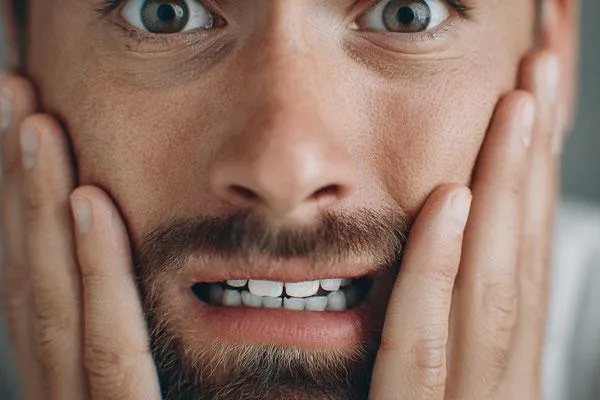
Why Am I Grinding My Teeth?
Why Am I Grinding My Teeth?
A Holistic Look at Bruxism and How to Find Relief
By Connie Bislev, Holistic Dental Hygienist & Holistic Health Practitioner
Teeth grinding — also known as bruxism — is one of the most common yet overlooked health issues affecting both adults and children. Often occurring during sleep or periods of high stress, bruxism can lead to jaw pain, headaches, worn-down teeth, and even disrupted sleep. But what causes it, how can you tell if you’re doing it, and most importantly, what can you do to relieve it naturally?
At Holistic Health CY, we believe in addressing not just the symptom, but the root cause — using a blend of traditional wisdom and modern holistic approaches.
What Causes Teeth Grinding? The 4 Most Common Triggers
Understanding why you grind your teeth is the first step to breaking the cycle. Here are the four key root causes:
1. Stress and Emotional Tension
Stress is the number one driver of unconscious teeth grinding. When your nervous system stays in “fight or flight” mode, when we don’t process or release emotional tension, then the tension often gets stored in the body — especially the jaw. This tension can build up during the day and express itself through subconscious jaw clenching — especially at night.
People with high anxiety or chronic emotional tension are particularly prone to grinding.
2. Airway Dysfunction or Sleep-Disordered Breathing
Airway issues are an often overlooked but major cause of bruxism. When the airway is partially blocked — due to nasal congestion, a small jaw, tongue posture issues, or undiagnosed sleep apnea — the body responds by grinding the teeth as a reflex to keep the airway open. This is particularly common during sleep.
3. Jaw Misalignment or Bite Imbalance
When your teeth or bite don’t align properly your jaw may overcompensate during rest, leading to unconscious grinding. This can also be made worse by missing teeth, poorly fitted dental work, an uneven bite or natural skeletal development.
4. Lifestyle and Sleep Disruptors
Caffeine, alcohol, and poor sleep quality can over stimulate the nervous system and make grinding worse. Certain medications, especially those affecting the brain or mood, may also contribute.
How to Know If You’re Grinding Your Teeth
Because bruxism often happens during sleep or times of stress, it’s not always easy to detect. Look out for:
• Morning jaw tightness, facial soreness or headaches
• Tightness or stiffness in the jaw muscles
• Clicking or popping sounds in the jaw
• Flattened, chipped, or sensitive teeth
• Poor sleep or frequent waking
• Partner notices grinding sounds during the night
• Scalloped edges on the tongue (a sign of tongue thrusting or tension)
If any of these sound familiar, it's worth exploring deeper — you don’t have to live with it.
Natural Ways to Relieve Jaw Tension and Support Healing
There are simple, holistic practices you can start today to reduce grinding and ease the tension in your jaw:
Here’s what you can do to start easing jaw tension naturally:
✅ Practice Jaw Awareness
Throughout the day, notice if you're clenching your jaw. Gently open your mouth and massage your cheeks, temples, and the sides of your neck to release tightness. You can also try to place your tongue on the roof of your mouth and let your jaw relax.
✅ Facial and Jaw Massage
Massage your jaw muscles with your fingers in slow, circular motions. Focus on the area just in front of your ears, the temples, and the base of the skull — all common tension zones. This increases blood flow and helps soften chronically tight muscles.
✅ Incorporate Breathwork or Meditation
Deep breathing activates the parasympathetic nervous system, helping calm the stress response. Even five minutes of slow, mindful breathing can make a difference. Meditation and mindfulness, even 5 minutes a day, can shift your body out of stress mode and into healing mode.
✅ Limit Caffeine and Alcohol
Both can overstimulate your nervous system and worsen nighttime grinding. Try switching to herbal teas like chamomile or valerian in the evenings.
✅ Consider Acupuncture or Tension-Release Therapy
At Holistic Health CY, we offer NADA ear acupuncture, and Tension Therapy specifically for jaw muscle relief. These gentle treatments can help retrain the nervous system and restore balance to your muscles and mind.
✅ Address Airway Health
If you suspect your grinding may be related to poor breathing at night, consider:
• Nasal breathing training
• Tongue posture exercises (Orofacial Myofunctional Therapy)
• Consulting a specialist for nasal check up and sleep apnea screening
• Using nasal dilators or taping the mouth (with guidance) to encourage proper breathing
✅ Holistic Therapies That Help
At Holistic Health CY, we offer:
• Acupuncture and NADA ear acupuncture to calm the nervous system
• Tension-release therapy for jaw and facial muscles
• Myofunctional therapy to address tongue and airway function
• Stress-relief coaching and breathwork
These gentle, natural therapies help restore balance and support your body in healing from the inside out.
Take the Holistic Path and Start Your Healing Journey Today
Teeth grinding is more than a dental issue — it is a message from your body — not just a habit, but a sign of deeper imbalance. By tuning into your stress levels, daily habits, and physical alignment, you can begin to break the pattern naturally.
Whether it’s stress, airway restriction, or structural tension, the good news is: there are holistic answers.
If you’re ready to explore a more holistic approach to oral and overall wellness, Holistic Health Cy is here to support you every step of the way.
👉 Visit www.holistichealthcy.eu to learn more, book a consultation, or discover our wellness offerings tailored to support your body’s natural healing.
